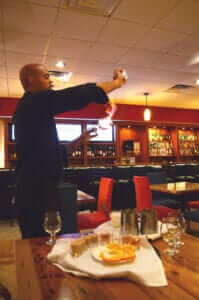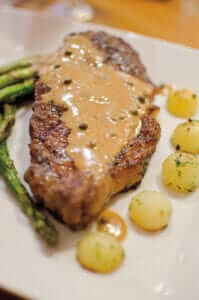South Hills Market and Café marks 10 years of Appalachian-inspired gourmet cuisine.
Shortly after opening South Hills Market and Café in 2007, chef and co-owner Richard Arbaugh realized he needed to make a change. A fairly drastic change.

Customers seemed to enjoy the à la carte takeout meals, but Arbaugh suspected that business might not last long. A local Kroger store started its own hot-and-ready meal option soon after the market opened. The food wasn’t as good as what Arbaugh was offering, but it was far more convenient.
He needed to make a pivot. Lucky for him, if there’s one thing a life in restaurant kitchens prepares you for, it’s an unexpected challenge.
First Course
Arbaugh grew up in Chatham, Virginia. His entrée to the world of fine dining was a summer job working at a bed and breakfast. The place was run by a chef, who served far more than bacon, eggs, and french toast at his table. “It was ‘farm to fork’ before ‘farm to fork’ was on the map,” Arbaugh says.
Although he started out washing dishes, Arbaugh was soon learning the basics of knife technique. He began helping the chef prep ingredients. Sometimes he’d go to the garden with a bowl and shears to get lettuce. Other times, he helped butcher rabbits and hogs.

After just one season at the resort, Arbaugh enrolled at the New England Culinary Institute in Vermont. He later returned to intern at The Greenbrier under Chef Robert Wong. Then, after he finished his schooling, he returned to Charleston to help Wong open the Bridge Road Bistro, where he met his soon-to-be wife, Anne.
After a few years, the couple moved to Virginia to work at The Homestead Restaurant in Catawba, Virginia, as the main dining room chef. But they wanted to live closer to Anne’s family and returned to Charleston in 2007 to open the market.
The House Special
Arbaugh opened his new restaurant on Charleston’s Bridge Road, just up the street from Wong’s restaurant. While some might have been upset that a former apprentice was now their competition, that wasn’t Wong’s style. The chef, who died suddenly following a tennis match in 2012, offered Arbaugh encouragement in those early days—directing catering business toward the market, popping over for a cup of coffee to see how things were going, and offering the occasional advice. “Chef taught me, don’t be afraid to push yourself,” Arbaugh says.
Arbaugh took this advice to heart when it came time to remake his business plan. Just six months after South Hills Market and Café opened, he tore out the market section of the restaurant and added more tables. They stopped serving breakfast and shifted the restaurant’s focus toward dinner. “We saw it as an opportunity to do a different kind of cuisine,” Arbaugh says.
A full decade before Appalachian cuisine started catching on in the national food scene, Arbaugh set about creating a menu of dishes that draw inspiration from the region. It gave the restaurant a unique identity and quickly earned it a dedicated following.

Sometimes Arbaugh takes traditional Appalachian ingredients and prepares them according to traditional French techniques, like the rock shrimp risotto with preserved morel mushrooms. Other times, the market takes a mainstream ingredient or dish and infuses it with Appalachian influence. The Fried Green Tomatoes, for instance, are served with a creole hollandaise sauce and house-pickled watermelon. The watermelon is inspired by Arbaugh’s grandmother, who always put salt on her melon to make it sweeter. “Appalachia’s that melting pot. It’s adapting to whatever the world threw at you,” he says.
Arbaugh’s commitment to Appalachian roots also extends to his choice of cookware. “People don’t realize how awesome cast iron is,” he says. Arbaugh and his kitchen crew make good use of their well-seasoned frying pans, churning out Cast Iron Tacos—available with beef, chicken, or grouper—and a selection of Cast Iron Pizzas.
Other customer favorites include the Short Rib Sliders—with smoked cheddar, shallot jam, and beef sourced from the locally owned Buzz Food Service—and the house-cured Braised Pork Belly, which comes on three onion–potato cakes, topped with a mustard sauce and a fresh trout roe.
But even more than the food, Arbaugh says he’s proud the market has earned a reputation for good service and has forged strong bonds with its customers—so strong, in fact, that the restaurant sometimes hosts the same diners two or three times a week. “The mentality needs to be, ‘It’s always a pleasure to see you, and it’s always a pleasure to serve you,’” he says.
That’s one thing Arbaugh doesn’t plan to change.
photographed by NIKKI BOWMAN











Leave a Reply